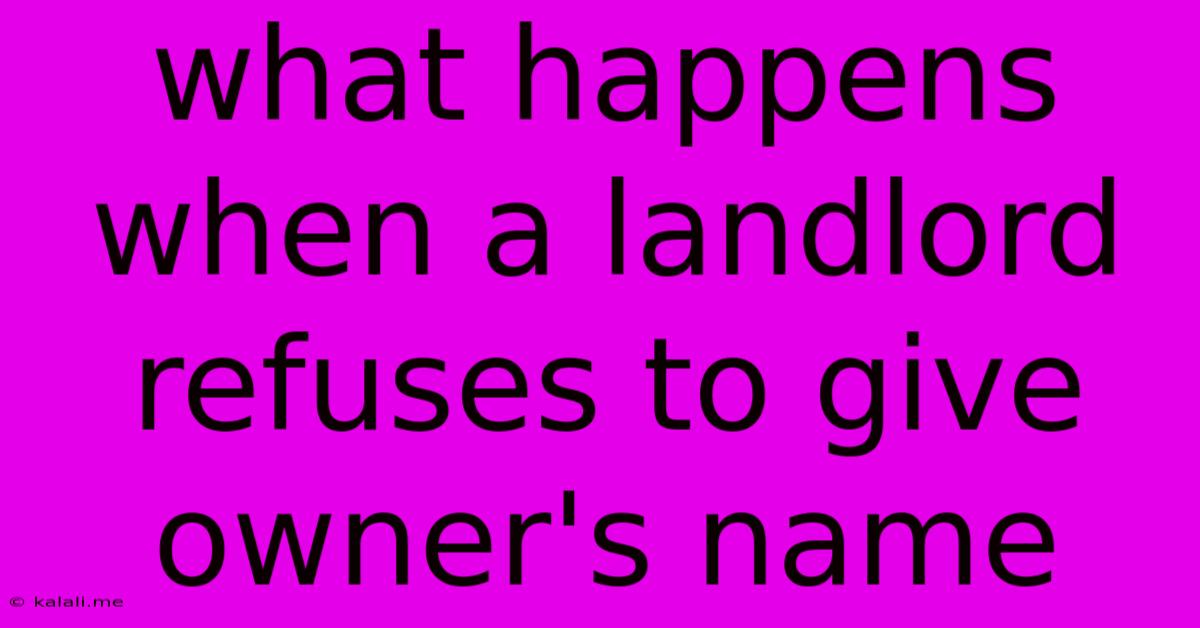What Happens When A Landlord Refuses To Give Owner's Name
Kalali
Jun 05, 2025 · 3 min read

Table of Contents
What Happens When a Landlord Refuses to Give the Owner's Name?
Knowing your landlord's identity is crucial for several reasons. It provides a direct point of contact for repairs, lease agreements, and addressing any disputes. However, some landlords may refuse to disclose the owner's name, leaving tenants in a precarious position. This article explores the potential consequences and legal recourse available when a landlord refuses to provide this information. Understanding your rights is the first step towards resolving the issue.
Why Landlords Might Withhold Ownership Information
There are several reasons why a landlord might be reluctant to reveal the owner's name. Sometimes, this is due to simple privacy concerns, particularly if the landlord is also the owner and manages the property themselves. However, there are instances where this refusal might signal a more problematic situation:
- Illegal Activities: Landlords involved in illicit activities, such as tax evasion or illegal renting practices, may hide their true identities to avoid detection.
- Property Management Companies: Large property management companies might not want to disclose the true owner's contact information, directing all tenant communications through themselves. While not inherently illegal, this can complicate communication and problem-solving.
- Unlicensed Landlords: In some jurisdictions, unlicensed landlords might conceal their identities to avoid legal repercussions.
- Poor Property Maintenance: Landlords who are aware of significant problems with the property might try to avoid direct communication with tenants.
Your Rights and Legal Recourse
The legality of a landlord withholding the owner's name depends significantly on your location and local laws. However, in many jurisdictions, tenants have legal rights to this information. Here's what you can do:
- Review your Lease Agreement: Your lease might contain a clause detailing who to contact in case of issues. Check this section meticulously.
- Check Local Tenant Laws: Familiarize yourself with your local and state tenant laws. Many regions have regulations regarding landlord transparency and disclosure requirements.
- Contact Your Local Housing Authority: Your local housing authority can often provide valuable information on your tenant rights and assist in resolving disputes. They may also be able to investigate if you suspect illegal activity.
- Send a Formal Written Request: Sending a certified letter requesting the owner's name creates a documented record of your request. This letter should be sent to the landlord's known address and clearly state your need for this information.
- Legal Advice: If all other attempts fail, consult with a tenant rights organization or a real estate attorney. They can advise you on the best legal course of action based on your specific situation and local laws.
Potential Consequences of Non-Disclosure
The consequences of a landlord refusing to provide ownership information vary. In some cases, it might not directly impact your tenancy, especially if the landlord themselves is the property owner and responsible for maintenance and repairs. However, in other scenarios, it can significantly hinder your ability to:
- Resolve Maintenance Issues: Delayed repairs can result from the inability to contact the responsible party.
- Negotiate Lease Renewals: Difficulty contacting the owner makes negotiating terms for a lease renewal challenging.
- Address Disputes: Lack of contact information creates an obstacle to efficiently resolving disputes related to the property or the lease agreement.
Conclusion
While some landlords may choose not to disclose their identity, tenants have legal avenues to pursue this information. By understanding your rights and exploring the resources available, you can increase the likelihood of identifying your landlord and protecting your interests as a tenant. Remember, proactive communication and documentation are vital in navigating such situations. Don't hesitate to seek legal advice if you encounter significant challenges in obtaining the necessary information.
Latest Posts
Latest Posts
-
I Can Relate With The Commoners
Jun 07, 2025
-
How To Keep Spices From Clumping
Jun 07, 2025
-
What Was In The Arc Of The Covenant
Jun 07, 2025
-
Can I Manually Closer Ac Damper
Jun 07, 2025
-
Did You Hear About The Magic Tractor
Jun 07, 2025
Related Post
Thank you for visiting our website which covers about What Happens When A Landlord Refuses To Give Owner's Name . We hope the information provided has been useful to you. Feel free to contact us if you have any questions or need further assistance. See you next time and don't miss to bookmark.